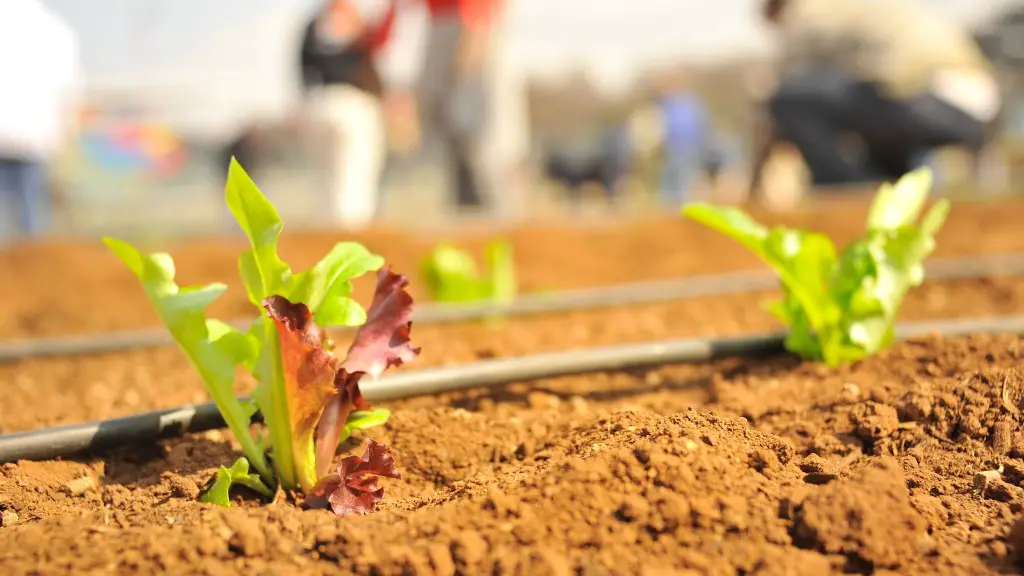It is no secret that GMOS (genetically modified organisms) have become an integral part of modern agriculture. Despite the ongoing discussion of the safety of GMOs, the fact is that GMOs are immensely important for the sustenance of food production and food security both globally and locally. Here are some reasons why GMOs are so important to agriculture.
First and foremost, GMOs effectively increase crop yields. Thanks to the genetic modifications made to the seeds, GMOs are engineered to be resistant to some pests and diseases, increasing their survival rate and resulting in increased food production. It’s also much faster and easier to spread beneficial traits through genetic modification than through traditional breeding, allowing farmers to take advantage of beneficial traits much faster.
Second, GMOs are much more efficient when it comes to using resources, such as water and fertilizer. This efficient use was made possible by the plants’ modified genes, enabling them to require less water and fertilizer. GM crops also tend to be more drought resistant than non-GMO crops, meaning farmers don’t have to worry about losing their crops in times of drought.
Third, GM crops require fewer pesticide applications, resulting in a lower environmental impact. This is because the genetically modified plants are already resistant to certain pests and diseases, meaning fewer pesticides are needed. As a result, farmers also don’t have to worry about their crops being damaged by pests or diseases.
Fourth, GM crops tend to be higher in nutritional value than non-GMO crops, meaning they provide more of the essential vitamins and minerals that we need in our diets. This is especially important for farmers in developing countries, where access to nutrients is often limited and the population relies heavily on the food produced by their own farms.
Fifth, GM crops are often more resilient and require less maintenance, increasing the overall productivity of farms. GM crops are also able to withstand a greater range of extreme weather conditions and other environmental stressors, making them more resilient than non-GMO crops.
Overall, GMOs are vital to modern agriculture due to their abilities to increase crop yields, reduce resource use, require fewer pesticide applications, have higher nutritional value, and be more resilient in extreme weather conditions. With the rise of climate change, GMOs will remain an important part of agriculture in the years to come.
Resistance to Herbicides
GMOs also have the ability to resist certain herbicides, allowing farmers to use herbicides selectively and with more control. Herbicides are usually used to control weeds and other pests, but traditional herbicides are often broad-spectrum and can harm the crops if used too indiscriminately. GM crops on the other hand can be engineered to be resistant to certain herbicides, meaning that the plants will not be harmed by the application of the herbicide but will benefit from its effects.
GMOs are also able to reduce the amount of labour needed to maintain the crops. GM crops are often self-fertilizing, meaning farmers don’t have to manually fertilize their crops. Similarly, GM crops can also be engineered to require less tilling, saving labour and energy, as well as reducing soil erosion.
Finally, GM crops have also enabled innovative technologies such as precision agriculture, which allows farmers to more efficiently manage their crops. Precision agriculture uses GPS tracking and other technologies to monitor crops in real time, enabling farmers to more effectively manage their crops in response to changing conditions. This effectively increases the productivity of farms, while also reducing the cost of production.
Achieve Environmental Benefits
Aside from the productivity benefits, GM crops are also beneficial for the environment. GM crops can help reduce soil erosion, as their modified genes enable them to require less tilling. As mentioned, GM crops also require fewer pesticide and herbicide applications, meaning there is less toxic chemicals in the environment.
GM crops can also be used to improve soil fertility, as certain GM crops are able to improve the soil by increasing the quantity of nitrogen available for other crops. GM technologies are also being developed that could help reduce air pollution from agricultural activities, such as the use of crop residue to reduce methane emissions.
Furthermore, GM crops can also help reduce water pollution, as certain GM crops are able to extract more nutrients, such as nitrogen and phosphorus, as well as more efficiently use water. This reduces the amount of chemicals and other pollutants that leach into the water sources, reducing the risk of water pollution.
Finally, GM crops can also reduce the amount of carbon dioxide entering the atmosphere. GM crops can be modified to increase their carbon sequestration potential, meaning they soak up more carbon dioxide from the atmosphere and store it in their roots. This helps to reduce the amount of carbon dioxide in the atmosphere, effectively reducing climate change.
Improve Human Health
GMOs can also be beneficial for human health, as certain GM crops are engineered to be higher in essential nutrients. Examples include rice modified to be higher in Vitamin A, potatoes modified to be higher in protein, and bananas modified to be higher in iron.
These GM crops can provide crucial essential nutrients to people in developing countries, where access to certain nutrients is often scarce. Similarly, GM crops can also be used to create new types of foods, such as golden rice, which is engineered to contain higher levels of Vitamin A, an essential nutrient.
GMOs can also be used to create new forms of vaccines, such as edible vaccines. Edible vaccines are created by using GM crops to contain the genes that encode for the desired antibodies, which can then be consumed to induce immunity.
In addition, GMOs can also be used to create medicines. Some GM crops have been engineered to contain genes that encode for therapeutic proteins, which can be extracted and used as a treatment for various diseases. This type of genetic engineering has enabled the development of new and innovative treatments, such as cancer therapies.
Provide Benefits to Farmers
Finally, GM crops provide significant benefits to farmers. They allow farmers to make better decisions when farming, due to the increased amount of information available about their crops. This information can help farmers become more efficient and productive, as well as increase their profits.
GMOs also allow farmers to reduce their costs. As mentioned, GM crops can be designed to reduce the amount of labour, water, and fertilizer needed, meaning farmers don’t have to spend as much money on inputs. Similarly, GM crops can also be designed to produce higher yields, meaning farmers can get more from their crops.
In addition, GM crops also provide some farmers with access to markets that they wouldn’t be able to access otherwise. Certain GM crops, such as those resistant to certain diseases, can open up markets for farmers that are otherwise limited due to disease control regulations.
Overall, GM crops provide a number of benefits to farmers, from increased yields and reduced costs, to increased access to markets. This means that GM crops are a valuable tool for farmers, helping them to become more efficient, productive, and profitable.





